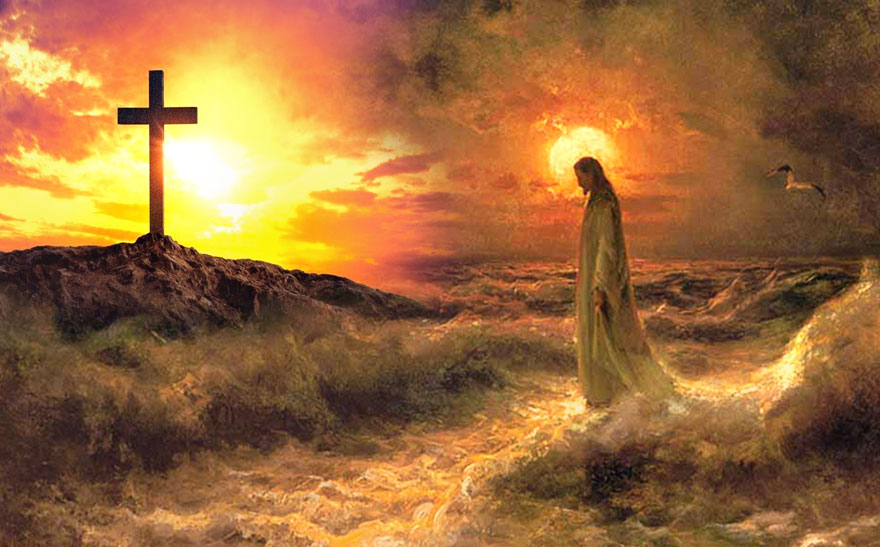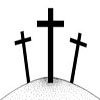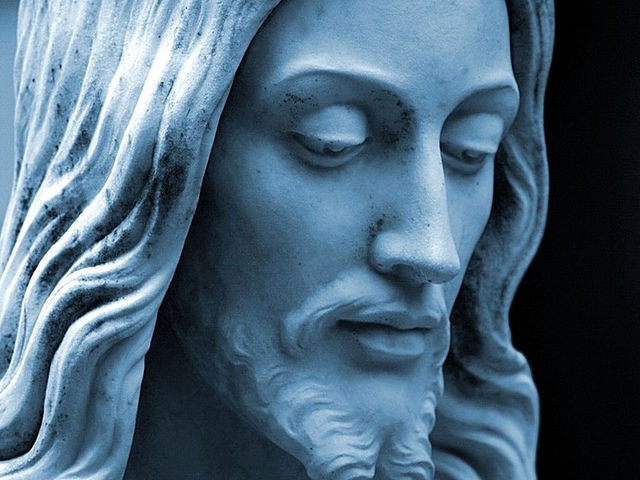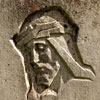The Crucifixion
 by Alexander Smyth
by Alexander Smyth
VISION THIRTY-SECOND.
The following night and morning after the condemnation of Jesus to death with the consent of Pilate, great preparations were made for the execution. As to the mode or manner of executing a criminal, there was none established by law, it being done in various ways, according to the will and pleasure of the authorities. But when great vengeance was sought to be wreaked upon the unfortunate victims, the crucifix was generally resorted to as the most cruel and ignominious of deaths. This mode was selected by the priests for the unfortunate Jesus. If there had been a more cruel and debasing mode known at the time, they would have chosen it; for their hatred, rancor, scorn and desire of vengeance knew no limits. They not only wished to glut their vengeance in inflicting agonies upon their victim, but they wished to set before the eyes of the people an example of their power, which was to impress them with horror, fear and submission to their wills; accordingly they strove to make this execution as terribly impressive as possible.
The usual place of execution that was selected was an elevated piece of ground without the city, called Golgotha, or Place of Skulls, from the quantity of such relics generally found there of criminals who had been previously executed. On the summit of this hilly spot a high and massive beam was erected with a transverse piece fastened near to the top, upon which the hands of the criminal were to be nailed with the arms extended; and on a small ledge below on the main beam his feet were to be fastened in like manner. Thus fastened, the criminal was allowed to linger in agonies until death put a period to his sufferings.
It was about noon on the following day when the procession to the place of execution began to form in front of the palace and fortress of Antonio. Thousands of people were collected to see the tragic sight; some being moved from hatred to the condemned man; some from sympathy and admiration of the man they considered to be a model of human perfection, wishing to see how he, they considered blameless in life, would deport himself in confronting death; and some were moved from an idle curiosity and a love of a general excitement, without any great love or hatred for the condemned. Besides, thousands of his disciples were present, who mourned in silence the sad fate of him they loved, yet whose cause they dare not openly espouse.
The Roman guards were numerous, enclosing a space where the procession was forming, and keeping the strictest discipline to maintain order and prevent a rescue or rising of the people. At length everything being ready the procession began to move along the main thoroughfare or street to the north-eastern gate of the city, to the place of Golgotha.
A small body of the Roman guards were in advance, clearing the route of people and all obstructions. A few paces behind came Pontius Pilate and the High Priest on horseback, the former dressed in his robe of State, and the latter in his sacerdotals, as though going to a high festival of the temple. As these representatives of the two great powers of the State passed by—one being the strong arm of political power, and the other the strong power of superstition, which kept the minds of the people enchained, the multitude became impressed with a fearful and solemn awe. All noises and clamors were suppressed for the time, but they gazed on intently with countenances expressive of great terror. Then came a body of the Priesthood headed by the Nasi, and judging from their deportment, they wished to make their appearance one of a solemn nature; yet from the sparkling of their eyes and curling of their lips, it seemed a joyous ovation to them. Then came another body of Roman troops, in the midst of whom was the much persecuted Jesus, the man of virtue, intelligence and truth, who had labored for the enlightenment and amelioration of his fellowmen; the man who had sacrificed all his worldly interests of time, wealth, consideration and ease to enable mankind to arrive at superior conditions. The last of his sacrifices was now about to be made. His life was about to be given up to appease his enemies, glut the vengeance of despots, tyrants, superstitious bigots, cold-hearted knaves, and all wicked men of sordid interests, who constitute the class opposed to the advancement of mankind from the errors and vices of old established notions. The virtuous victim was not cast down; he bore himself up with conscious dignity as the lover and dispenser of truth, virtue and justice, indicating that all was peace within. Sometimes a sweet smile would play upon his lips of gratefulness and brotherly love as he noticed the tearful demonstrations of sympathy given by some of the spectators. Slightly bowing his head, he acknowledged the signs of their heartfelt love, and passed on. Then followed another body of the Priesthood, headed by the Abithdin, of a similar appearance to the former, and the rear was brought up by another division of troops. The multitude then followed indiscriminately. Both sides of the main street were densely thronged with the people. All the porches, windows, avenues and house-tops were filled with spectators. Some uttered exclamations of hatred and disapprobation as the Priesthood passed, but no one thus saluted the victim—not even those who were not his admirers. On the contrary, tears poured fast and copious from the majority of the people; deep sighs were heard and distressing wailings as well as lamentable expressions were uttered. There were scarcely any, excepting the priests, who did not lament the fate of so excellent a man.
Thus the tragical procession moved on to the fatal spot where he was to make the last effort of his pledges to the people. At length they arrived at the gate at the boundaries of the city through which they passed, and thence along the country road by several suburban villas and fields of culture, until they came to a gently rising hill, upon the top of which they saw the fatal cross where he was destined to pay the forfeit of his life. At the foot of this hill were assembled a multitude of females—the fair maiden and the sober matron, all of whom seemed to be bowed down with grief. The two daughters of Lazarus were there, having come to take the last sight and wave the last adieu of the only man of the world for whom they cherished a love greater than that of a sister’s. Mary was pale, though she seemed composed; some fixed idea or resolution seemed to support her on this trying occasion, but Martha gave vent to tears and great wailings. When the procession arrived at this spot, there was a halt made to make some further arrangements; when Jesus perceiving the women on either side of him and recognizing the daughters of Lazarus, he desired one of the guards to go to Pilate, requesting the indulgence of a few minutes’ stay, and permission to bid adieu to the females. The guard did as he was requested, when Pilate consented, though Caiaphas wished to oppose it. However, the Governor would not be overruled in this respect, so that permission was given, when Jesus taking a prominent position among them, thus addressed them:
“Weep not, Mothers and Daughters of Jerusalem; weep not for me! Rather weep for yourselves, your sons, your husbands, brothers and fathers. For me there is no occasion to weep—all is peace and tranquility within me, and a serene pleasure pervades me from consciousness that I have done my duty to you all, to my country at large, and set an example to be followed by other men for the love and benefit of all mankind. No one knows as well as myself how well I have loved you, and no one knows, excepting me, how I have labored, studied, hoped and aspired to do great things to your benefit and make you all happy. It behooves me, then, to speak in these last moments, and I doubt not you will accept my words as the truth. I have long seen the errors, the vices and unhappiness of our people as a nation, and I have been enabled to see the causes thereof. My love for my country as a whole—for your fathers, husbands and brothers in particular, and you as my sisters—have stimulated me to do what I have done. I knew the evils I should have to encounter, the risk I should run, and the probable forfeit I should have to pay of my life in the end; but this did not deter me from the undertaking. No personal sacrifice could deter me from doing what I conceived to be my duty. I ventured upon the task, and I have been prosperous in sowing the seeds of reform. At length the strong arm of political power and superstitious hatred have put a stop to my endeavors to do more. I am doomed to a mortal death, by which my enemies think to put a stop to the object of my labors, and then they think to triumph over me. But how foolish and narrow are their conceptions! They know not the events of the future which will result from their actions as well as mine. Women of Jerusalem, I have not labored in vain. I have done much good to thousands of my fellow countrymen, as they can testify. I have led them out of the darkness of a vile superstition, corrected their errors and vices, and gave them an idea of what is true life; and the seeds of reform that I have sown shall rise up into a bountiful harvest among the seekers of truth. My words and my love to you all shall not die; though I as a mortal man shall be no more, yet the babes that now suckle at your bosoms shall receive the benefit of my labors, my love, and the sacrifice of my life. My enemies think when they have sacrificed my life, that they have destroyed me and my influence. How grossly dark are their conceptions of the nature of man! No, mothers and daughters of Jerusalem, it is not so. They cannot destroy me, but they free me from the toils and vexations of an earthly life, and give me admission into a spiritual one which is full of beauty, interest and happiness. Yes, women of Jerusalem, after I have drank of the bitter cup of death, my spirit goes to another world far superior to this. Where I go my enemies cannot come until thoroughly reformed, now, for their gross natures, their ignorance, vices and wickedness so much outweigh their virtues, that they are allied to the grosser matter of earth. But you, my friends, who have wept for me in pure sympathy, who have forsaken the darkness of Mosaical superstition, and aspire to the true light, by following my doctrines, this world of beauty and bliss shall be open to you. There we will all meet again, and embrace each other in pure friendship and love.”
Then Jesus turning his regard to Mary and Martha, gazed upon them for a few moments with great tenderness, regret and love, and at length resumed his discourse:
“Now, my dear sisters, I must bid you adieu. Believe me, that to the last beating of my heart, I shall be sensible of your kindness and tender sympathy with me, which will tend to assuage the bitter moments of a cruel death. Weep not for me, mothers and daughters of Jerusalem, but weep for the city of your birth; for the time will come, and it is not far distant, when the remaining two tribes of Israel will be scattered to the four winds of the earth—their name as a nation will be lost, and they shall become the thing of reproach, scorn and disgust to all the other nations of the earth as a people, so far lost to everything noble as to destroy the only man who endeavored to save them. Woe, woe to Jerusalem!”
Jesus having ended his address, the procession was ordered to move on. Scarcely had he withdrawn his eyes from taking the last look of the daughters of Lazarus, when a piercing cry was heard, and Mary was seen to fall insensible to the ground. A young man, who was at no great distance, rushed to her assistance, and taking her by the hand, he saw something which caused him to start with astonishment, and for a few moments checked his benevolent intentions. However, he soon recovered his presence of mind; for, by gently placing his arm around the maiden, he raised her from the ground, and while her sister Martha and the rest of the females were engaged in looking on the procession and the last looks at Jesus, he slipped out of the crowd unperceived, carrying the maiden with him. In the meantime the procession continued its course up the hill, and at length arrived at the foot of the cross.
Excerpt from The True Life Of Jesus Of Nazareth
Posted in Book Excerpts, The True Life of Jesuswith comments disabled.





